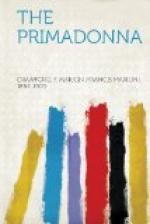Then, too, she has her ‘following’ of ‘girls,’ thousands of whom have her photograph, or her autograph, or both, and believe in her, and are ready to scratch out the eyes of any older person who suggests that she is not perfection in every way, or that to be a primadonna like her ought not to be every girl’s highest ambition. They not only worship her, but many of them make real sacrifices to hear her sing; for most of them are anything but well off, and to hear an opera means living without little luxuries, and sometimes without necessaries, for days together. Their devotion to their idol is touching and true; and she knows it and is good-natured in the matter of autographs for them, and talks about ‘my matinee girls’ to the reporters, as if those eleven thousand virgins and more were all her younger sisters and nieces. An actress, even the most gifted, has no such ‘following.’ The greatest dramatic sopranos that ever sing Brunhilde and Kundry enjoy no such popularity. It belongs exclusively to the nightingale primadonnas, whose voices enchant the ear if they do not always stir the blood. It may be explicable, but no explanation is at all necessary, since the fact cannot be disputed.
To this amazing popularity Margaret Donne had now attained; and she was known to the matinee girls’ respectful admiration as Madame Cordova, to the public generally and to her comrades as Cordova, to sentimental paragraph-writers as Fair Margaret, and to her friends as Miss Donne, or merely as Margaret. Indeed, from the name each person gave her in speaking of her, it was easy to know the class to which each belonged.
She had bought a house in London, because in her heart she still thought England the finest country in the world, and had never felt the least desire to live anywhere else. She had few relations left and none whom she saw; for her father, the Oxford scholar, had not had money, and they all looked with disapproval on the career she had chosen. Besides, she had been very little in England since her parents’ death. Her mother’s American friend, the excellent Mrs. Rushmore, who had taken her under her wing, was now in Versailles, where she had a house, and Margaret actually had the audacity to live alone, rather than burden herself with a tiresome companion.
Her courage in doing so was perhaps mistaken, considering what the world is and what it generally thinks of the musical and theatrical professions; and Mrs. Rushmore, who was quite powerless to influence Margaret’s conduct, did not at all approve of it. The girl’s will had always been strong, and her immense success had so little weakened her belief in herself, or softened her character, that she had grown almost too independent. The spirit of independence is not a fault in women, but it is a defect in the eyes of men. Darwin has proved that the dominant characteristic of male animals is vanity; and what is to become of that if women show that they can do without us? If the




